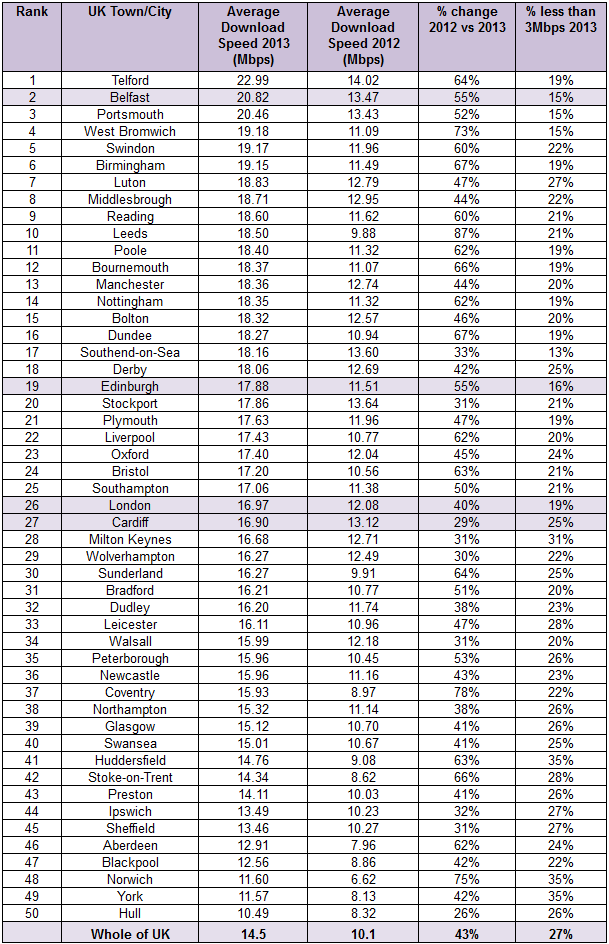The Fastest Top 50 Big UK Towns and Cities for Broadband Internet Speed

A new study from uSwitch, which is based on data from 1.4 million anecdotal Internet speed tests (conducted between April and September 2013), has revealed that Telford in Shropshire (England) is the fastest of the top 50 biggest UK towns and cities for broadband speed with an average download of 22.99Mbps (just below the government’s 24Mbps+ definition for “superfast“).
The survey also found that Belfast is the only capital city with average download speeds of more than 20Mbps (i.e. 20.82Mbps), which outpaces London (16.97Mbps), Cardiff (16.90Mbps) and Edinburgh (17.88Mbps). Similarly 27% of broadband users across the whole of Britain were found to still have speeds of under 3Mbps.
Advertisement
As a result uSwitch claims that “not a single UK town or city is super-fast yet when it comes to broadband“, although it should be noted that the reported speeds are “averages” and it might thus be more accurate to say that real-world speeds in significant parts of these areas are not yet superfast due to various reasons (explained further down). But the outcome should at least remind people that broadband isn’t just a problem for rural areas (here).
On the other hand even the slowest of the top 50 locations, which is ironically Hull where KC are busy rolling out a new fibre optic (FTTH/C) network, still gets a performance of 10.49Mbps and that’s still above Ofcom’s latest average of 9.9Mbps for rural areas. But happily most areas have at least seen a significant improvement in performance since the same study was conducted in 2012 and a few have almost doubled their speeds (e.g. Leeds).

However it’s important to take such studies with a big pinch of salt because they can often overlook key factors, such as the impact of Traffic Management measures, poor home wiring, slow wifi networks and natural fluctuations in broadband speed between congested peak and uncongested off-peak periods (it’s unclear when the bulk of uSwitch’s tests were conducted)
In addition many areas might have access to superfast broadband connections but that doesn’t mean to say that everybody is actually using one. A poll of 2,100 people conducted by uSwitch earlier this year found that 47.8% of those covered by superfast connectivity had not taken the service because they said it was still “too expensive” (superfast connections can attract a +£5-£15 per month premium).
Advertisement
Elsewhere countries like South Korea, which has a strong national fibre optic (FTTH) network, rarely deliver average speeds of even close to the 100Mbps+ capability of their lines. One of the reasons for this is because consumers are often given a choice of slower speed packages (i.e. the technology can go ultrafast but not everybody feels a need for such speeds.. yet).
Mark is a professional technology writer, IT consultant and computer engineer from Dorset (England), he also founded ISPreview in 1999 and enjoys analysing the latest telecoms and broadband developments. Find me on X (Twitter), Mastodon, Facebook, BlueSky, Threads.net and Linkedin.
« BBC Watchdog Hammers BT Openreach for Poor Communication and Delays





















































Comments are closed